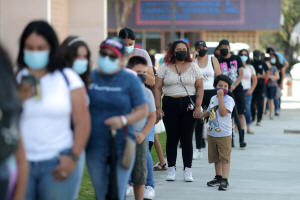Biden shedding support from independent voters as Delta variant spreads:
Reuters poll
 Send a link to a friend
Send a link to a friend
 [August 27, 2021]
By Chris Kahn and James Oliphant [August 27, 2021]
By Chris Kahn and James Oliphant
NEW YORK (Reuters) - President Joe Biden is
shedding support from independents, a crucial voting bloc that helped
Democrats win the White House and Congress last year, as a resurgence of
COVID-19 cases slows the country's return to normal from the pandemic,
Reuters/Ipsos polling shows.
The drop in support comes at a precarious time for the first-year
president, whose administration has been under fire for its handling of
the pullout of U.S. forces from Afghanistan.
On Thursday, more than a dozen U.S. troops and dozens of civilians were
killed when suicide bombers struck the crowded gates of Kabul airport.
At home, the COVID-19 pandemic has surged anew, especially in populous
Republican-led states such as Florida and Texas that have resisted new
restrictions to hamper the spread of the Delta variant of the virus.
Despite Biden's push for vaccinations, 39% of U.S. residents have not
had even their first shot, according to data from the U.S. Centers for
Disease Control and Prevention.

The national opinion poll, conducted Aug. 13-19, found that Bidenís net
approval among independents dropped by 14 percentage points overall
since June, and by 19 points for his handling of the coronavirus. Still,
a slim majority of independents - 53% - said they approve of Biden's
pandemic response.
Independents are turning away from Biden even though most share his
concerns about the coronavirus and have consistently joined with
Democrats in supporting more preventive measures.
The August poll found that 66% of independents support mask requirements
at restaurants, gyms and on airplanes, while 25% oppose them. Fifty-five
percent say vaccines should be required for people who want to go back
to the office, while 37% say they should not.
When asked who should be blamed for the resurgence of COVID-19, 47% of
independents said unvaccinated people, compared with 12% who blamed
Biden.
The decline in Biden's popularity is more likely to be a sign of
exhaustion with the pandemic than it is about their support for his
ideas, said Robert Blendon, a health policy and public opinion expert at
the Harvard School of Public Health.
Josh Schwerin, a Democratic strategist who worked for Democratic super
PAC Priorities USA, said Biden and Democrats must continue to draw a
contrast with their approach and that of Republicans such as Florida
Governor Ron DeSantis, who has pushed back against mask and vaccine
mandates.
"Thousands of Americans are dying as a result," he said.
BROADER EROSION
After largely favoring Biden over Republican incumbent Donald Trump in
the 2020 election, independents are now evenly split in their support
for the president: 46% approve of Bidenís performance in office, while
46% disapprove. Two months ago, 52% of independents approved of Biden's
overall performance, while 38% disapproved.
The decline is part of a broader erosion in Bidenís popularity among all
Americans as the president deals with the pandemic and the fallout from
Afghanistan. Last week, Reuters/Ipsos polling showed that for the first
time in his presidency more Americans disapproved of Biden than approved
of him.
[to top of second column]
|

People wait in line for a coronavirus disease (COVID-19) test at a
back-to-school clinic in South Gate, Los Angeles, California, U.S.,
August 12, 2021. REUTERS/Lucy Nicholson

Among all Americans, Biden's net approval for the
coronavirus dropped by 21 points from June to August: 55% approved
of his handling of the virus, down 10 points from June, while 39%
disapproved, which was up by 11 points.
His net approval was relatively stable elsewhere - dropping between
3 and 5 points over the same period on the economy, immigration and
the environment.
It is far too early to say how much the recent drop in public
approval will affect Biden's partyís chances of retaining control of
Congress in next year's midterm elections. But it does show how
closely tied Biden's support is to the coronavirus crisis and how
vulnerable he would be politically if the rate of infections does
not subside.
Last year in his campaign against Trump, Biden made bringing the
pandemic to an end a centerpiece of his message, pledging a return
to a degree of normalcy by this summer.
Instead, a wave of new cases, hospitalizations and deaths, largely
among those who have refused to get vaccinated, has bedeviled his
administration.
"(Biden) owns the coronavirus issue now," said Seth Masket, a
political scientist at the University of Denver. "A lot of people
thought it would be over by now, and instead itís back."
Seventeen months into the pandemic, many Americans continue to work
from home as employers postpone office reopenings in the face of the
Delta variant. Mask wearing is widespread again and there are
concerns about a further spike in cases as children return to
school.
"It seems like weíre losing the battle now" with the coronavirus,
said Josť Guerra, 62, an independent from Kingsville, Texas, who
took the poll.

The Reuters/Ipsos poll was conducted online, in English, throughout
the United States. It gathered responses from 4,427 U.S. adults,
including 2,033 Democrats, 1,531 Republicans and 527 independents.
The findings have a credibility interval, a measure of precision, of
2 percentage points for the entire sample and 5 points for
independents.
(Reporting by Chris Kahn and James Oliphant; Editing by Soyoung Kim
and Peter Cooney)
[© 2021 Thomson Reuters. All rights
reserved.] Copyright 2021 Reuters. All rights reserved. This material may not be published,
broadcast, rewritten or redistributed.
Thompson Reuters is solely responsible for this content. |